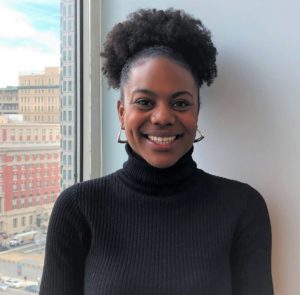This fall, Fairmount’s introducing readers to the newer members of our team, who’ve arguably made the most adaptive shifts to consulting in abnormal times this year. Chelsea Hicks, Project Manager, joined the team pre-pandemic and has since been advising clients remotely and connecting with teammates via our virtual “hub”. Her experience and facility with organizational process, stakeholder engagement and communications, and finance advances a range of client strategic planning and executive search projects. Chelsea also plays a leadership role on Fairmount’s staff-led Social Justice Committee. She earned her B.A. in Economics from Swarthmore College.

FV: With 2020 shining a light on the need for a strong nonprofit sector, what are a few of the ways you’ve helped clients respond to emergent crises and connect with key stakeholders in recent months?
CH: The primary ways I have supported clients during this time is serving as both thought partner and confidant. I often find that in moments of crisis, what is often needed is a moment of pause – a chance to understand if the right questions are being asked to solve the problem, a chance to understand if the right people are around the table to solve the problem, and a chance to recognize what is emotionally driven versus what is in the best interest of the organization.
FV: How does your expertise in financial analysis and organizational planning processes inform your current work for Fairmount clients?
CH: It informs my work in two foundational ways. First, within organizations there is often the desire to privilege finances or financial knowledge over the knowledge of other functions of an organization. I’ve found this often leads to a situation in which finance leads function rather than function leading finance. Therefore, in my work I regularly seek ways, organizationally, for finance and other functions to interact and to support clients in recognizing the synergies which should exist. The second, is that the process is often more important than the outcome. I ground my work in understanding how to ensure the process is as inclusive as possible, the appropriate voices are supporting the conversation, and the process is communicated such that there is an organizational understanding of the work. We often are only with clients for a short period of time, and we want to leave with them not just a plan or strategy, but a framework to model how they should pursue change-making processes when we are no longer there.
FV: What does Fairmount’s social impact mission mean to you, especially in this moment?
CH: To me, Fairmount’s social impact mission is really tied to the well-being of Philadelphia. In part what drew me to Fairmount was this commitment to supporting the Philadelphia area, which has been home to me for as long as I can remember. In this moment in particular, it has been devasting to see the impact this year has had on our city, but I am also energized. I’m energized by the commitment of our team to ensure we are living up to our values of diversity and inclusion in our work, I’m energized by my clients who despite devasting situations are never willing to give up, and I’m energized by the prospect of a complete reimagining of our city, from policing and public safety, to public space use, to the recognition of essential work. I’m excited to see what is to come, and excited to be a part of a firm that can support this movement of change.
FV: No day is “typical” anymore. Tell us how you engage with clients, your Fairmount teams, and the nonprofit sector while working virtually.
CH: Working virtually has provided me a new appreciation and understanding of the full lives of my clients, my co-workers, and my fellow volunteers. In this new world, I find that my engagement with clients, co-workers, and others is more flexible than it has ever been. I think it is important to recognize that none of us have ever experienced anything like this before, and so we must all give ourselves the grace to recognize that maybe that meeting that was scheduled two weeks ago might get cancelled, or that event might have to be shorter than planned, and that is perfectly okay.
FV: How are you finding ways to unwind and recharge? What gives you energy?
CH: In true transparency, I’m a highly social person who typically receives energy through people and in spaces of community, and so this last year has been very difficult. I’ve also found that I have been experiencing the stay-at home period in various waves, what worked for me early in the Spring and in the Summer (which included lots of television and multiple at-home YouTube workout videos) no longer seems to work now. I’m very much someone who derives energy from experiencing or doing something new, and so I have tried to get a sense of how to get that energy while remaining safe. I recently began taking longer walks again and found there is a surprising level of joy I find by just discovering a new path, or seeing the decorations change as we enter the holiday season. Nevertheless, I’m always open to ideas and suggestions, and so if anyone has a few tried and true practices definitely send them my way!
